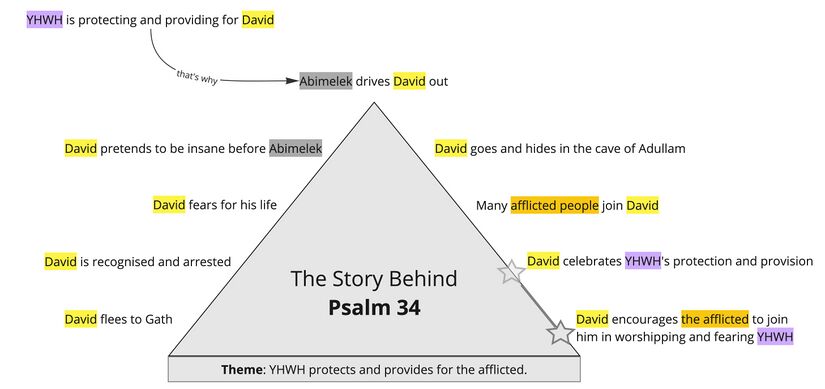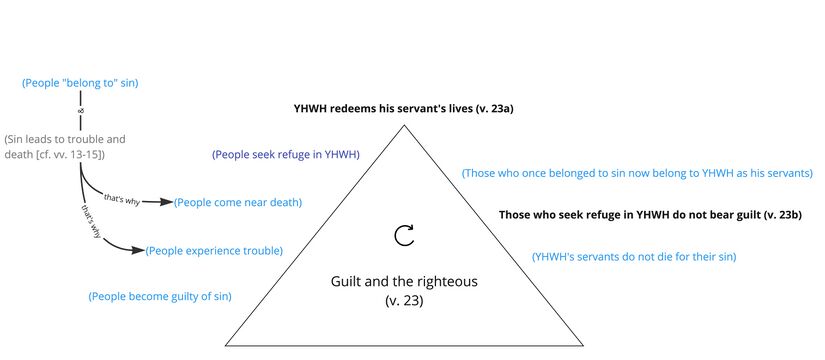Psalm 34 Story behind the Psalm
About the Story Behind Layer
The Story behind the Psalm shows how each part of the psalm fits together into a single coherent whole. Whereas most semantic analysis focuses on discrete parts of a text such as the meaning of a word or phrase, Story Behind the Psalm considers the meaning of larger units of discourse, including the entire psalm. (Click 'Expand' to the right for more information.)
The goal of this layer is to reconstruct and visualise a mental representation of the text as the earliest hearers/readers might have conceptualised it. We start by identifying the propositional content of each clause in the psalm, and then we identify relevant assumptions implied by each of the propositions. During this process, we also identify and analyse metaphorical language (“imagery”). Finally, we try to see how all of the propositions and assumptions fit together to form a coherent mental representation. The main tool we use for structuring the propositions and assumptions is a story triangle, which visualises the rise and fall of tension within a semantic unit. Although story triangles are traditionally used to analyse stories in the literary sense of the word, we use them at this layer to analyse “stories” in the cognitive sense of the word—i.e., a story as a sequence of propositions and assumptions that has tension.
Story Behind Visuals for Psalm 34
Summary Triangle
The story triangle below summarises the story of the whole psalm. We use the same colour scheme as in Participant Analysis. The star icon along the edge of the story-triangle indicates the point of the story in which the psalm itself (as a speech event) takes place. We also include a theme at the bottom of the story. The theme is the main message conveyed by the story-behind.

Background ideas
Following are the common-ground assumptionsCommon-ground assumptions include information shared by the speaker and hearers. In our analysis, we mainly use this category for Biblical/Ancient Near Eastern background. which are the most helpful for making sense of the psalm.
- The appropriate response to YHWH's deliverance is to bless/praise YHWH (cf. Ps. 103).
- Lengthening one's days (i.e., living a long time) and seeing "good" is a tremendous blessing (cf. Ex. 20:12; Deut. 5:16, 33; 6:2; 25:15; 1 Kgs. 3:14; cf. Paul Sanders, "A Long Life as a Blessing in the Old Testament and the Ancient Levant," forthcoming.).
- Fearing YHWH is the key to a long and peaceful life (cf. Deut. 5:33).
- The alphabet is a symbol of completeness (cf. Gottwald 1954, 23-32; IVP Dictionary, “Acrostic”, Soll Anchor Bible Dictionary; Watson, Classical Hebrew Poetry 2001; Zenger 1993, 211). In an acrostic poem, the poet takes a topic (e.g., Torah [Ps. 119], or the virtuous woman [Prov. 31]) and expounds on it completely (from every possible angle), so that the reader walks away with a high-resolution image of the topic (i.e., he/she understands it “from A to Z”).
Background situation
The background situation is the series of events leading up to the time in which the psalm is spoken. These are taken from the story triangle – whatever lies to the left of the star icon.

Expanded paraphrase
The expanded paraphrase seeks to capture the implicit information within the text and make it explicit for readers today. It is based on the CBC translation and uses italic text to provide the most salient background information, presuppositions, entailments, and inferences.
(For more information, click "Expanded Paraphrase Legend" below.)
| Expanded paraphrase legend | |
|---|---|
| Close but Clear (CBC) translation | The CBC, our close but clear translation of the Hebrew, is represented in bold text. |
| Assumptions | Assumptions which provide background information, presuppositions, entailments, and inferences are represented in italics. |
v. 1
This song was written By David. He wrote it as he reflected on the time when he fled to the Philistine city of Gath and was recognized as the famous warrior of Judah who had slain Goliath of Gath and was arrested by the servants of Abimelek the king of Gath. David was afraid for his life, and in an attempt to escape, he pretended to be insane before Abimelek, and Abimelek falling for the trick and not wishing to have insane people around him drove him (David) out of his presence, and he (David) went safely away from Gath and hid in the cave of Adullam where many afflicted people joined him. David said to them
v. 2
YHWH has rescued me! So, in response to what YHWH has done for me I will bless YHWH at all times. YHWH has earned my constant admiration and appreciation, and so His praise will continually be spoken and sung in my mouth.
v. 3
My soul boasts not in myself, but in YHWH because I did not save myself. Rather, YHWH is the one who rescued me. May the afflicted hear about what YHWH did for me and be glad because, if YHWH can rescue me, an afflicted person, then he can rescue other afflicted people, too!
v. 4
Extol YHWH with me , all you afflicted people, because YHWH is great, and let us exalt his name together!
v. 5
I myself was afflicted. I was afraid for my life, and I did not know what to do. But then I sought YHWH to see what I should do and he answered me and gave me the idea and the ability to pretend to be insane before Abimelek and he made the attempt successful, so that Abimelek drove me out and thus he (YHWH) rescued me from all my terrors.
v. 6
When you are in a similar situation, afflicted like I was, gaze at him (YHWH) with confident expectation and you will glow with joy, because he will answer your prayer and you will not be disappointed, and do not seek help from elsewhere and so let your faces be ashamed!
v. 7
This —I am referring to myself— is a poor and afflicted man who called out to YHWH for help and YHWH heard him and saved him from all his troubles. If YHWH saved me, then he can save you too, if you call out to him amidst your troubles.
v. 8
Whenever YHWH's people are surrounded by enemies YHWH’s angel encamps all around those who fear him to guard them on every side and when the enemies try to attack he delivers them (those who fear YHWH) so that they are safe from all harm.
v. 9
YHWH delivers his people, because YHWH is good. Call out to him for deliverance, and so Taste and see for yourself that YHWH is good! Happy is the man who seeks refuge in him.
v. 10
Fear YHWH, you holy ones of his who belong to him and are devoted to his service! For those who fear him have no lack. Therefore, if you fear YHWH, he will provide for you, and you will not lack.
v. 11
Even Young lions who, being fierce hunters are the least likely of all creatures to go hungry have suffered want and been hungry, but those who seek YHWH and do not, like lions, rely on their own power to meet their needs will not lack any good.
v. 12
Come, you who are my students and so are like my children! Listen to me! I will teach you the fear of YHWH.
v. 13
Who among you is the person who desires life, who wants to live a long time, who loves to see good? Surely, each of you desires a long life full of good for this is widely regarded as a tremendous blessing.
v. 14
If you are such a person, then here's what you must do: Keep your tongue from speaking evil and your lips from speaking deceit!
v. 15
Turn away from evil and do good! Seek peace and pursue it! This is what it means, practically, to fear YHWH, and those who fear YHWH will live long and happy lives, because YHWH protects and provides for those who fear him.
v. 17*
By contrast, YHWH’s face is against those who do evil, so as to remove the memory of them from the earth so that those who do evil will never be remembered.
v. 16*
YHWH’s eyes are directed towards the righteous so that he sees them in their distress, and his ears are attentive to their cries for help so that he hears them when they cry out to him.
v. 18
Here is something that I have seen in the past, and it is typical of what happens again and again: When the righteous experienced trouble they called for help, and YHWH heard them, and he delivered them from all their troubles.
v. 19
YHWH delivers the righteous, who are afflicted, because YHWH is near to the broken-hearted and thus he is able to hear them when they call out for help and he saves the crushed in spirit.
v. 20
The hardships of the righteous are many, but YHWH rescues him from all of them.
v. 21
He (YHWH) protects all his (the righteous person's) bones. Not one of them has broken.
v. 22
By contrast, YHWH does not rescue the wicked from hardship. Instead, hardship afflicts and then eventually finishes off a wicked person, and in this way those who hate a righteous person bear their guilt.
v. 23
Whereas the wicked become guilty of sin, experience hardship as a result of their sin, and then eventually die from their hardships, YHWH forgives, and thereby redeems his servants’ lives from sin, hardship, and death so that they no longer belong to sin, hardship, and death but now belong to him as his servants and so no one who seeks refuge in him will ever bear guilt.





